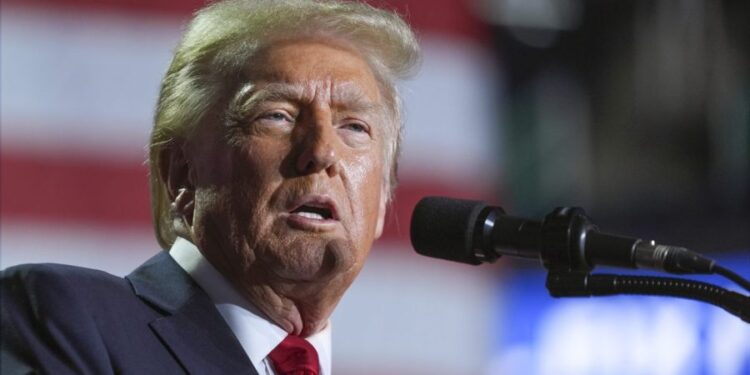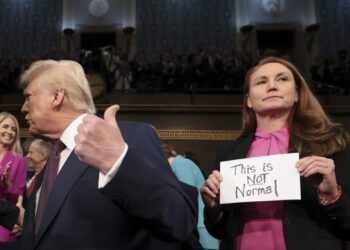
When Donald Trump said during the campaign that he could end the war in Ukraine in 24 hours, it was widely understood as a menacing message to Volodymyr Zelensky that Trump would cut off all aid to Ukraine and force it to capitulate, granting territorial and sovereignty concessions to Russia. A conceivable but far less likely scenario was that Trump would threaten dire consequences to Moscow if it did not stop the war and withdraw from Ukraine.
Trump also said repeatedly that if he had been president in 2022, Vladimir Putin would never have invaded Ukraine, as he did during both the Obama-Biden and Biden-Harris administrations. That claim, too, was subject to contrasting interpretations — either Putin would be deterred by Trump’s claimed warnings of an overwhelming U.S. response, or he would assure Putin there was no need to invade since he would get what he wanted without war.
The world will soon see either a resolute or an appeasing Trump.
Now, even though he is not yet president, Trump has been engaged in direct or virtual negotiations between Zelensky and Putin, with both leaders initially rejecting the concessions he is demanding. As he well knows from his business dealings, agreement is not achievable until one side or the other, or both, decides that it has more to gain or less to lose by compromise than by continued fighting and struggle.
Ongoing war will cost the lives of both Ukrainians and Russians, and now also of North Koreans who have joined the war on Russia’s side, as well as the destruction of assets on both sides. But even though Russian and North Korean losses continue to be substantially higher than Ukraine’s, the dictators’ disregard for human life is infinitely higher than the democracy’s. Moscow and Pyongyang will spend as many of their people’s lives as they deem necessary to satisfy their aggressive intentions.
As for property and weapons losses, even though Ukraine’s Western allies are wealthier than Russia’s, their will to continue funding the war is waning faster than the tolerance of the Axis of Evil regimes to divert resources from domestic needs to expansionist ambitions.
The element that incentivizes Ukraine to persevere and accept further sacrifices is the ultimate value of any nation: its sovereignty, 80 percent of which Ukraine still possesses and which Russia lusts to take for itself.
The parallel situation that America’s adversaries and allies are watching with extreme interest is that of democratic Taiwan’s vulnerability to similar aggression from Communist China. The calculus of human and material loss will be even more imbalanced in China’s favor, with its utter disregard for people and the West’s unwillingness to risk major conflict for the sake of a small island democracy less than 100 miles from a covetous giant autocracy.
But Taiwan’s status as part of the Free World, never having been ruled by the People’s Republic of China, with the Taiwan Strait at the geostrategic connection between the East and South China Seas, make it of vital importance to the West. One-fifth of global shipping trade passes through the Strait making it an indispensable part of the global economy. The international norms of freedom of the seas and the inviolability of national borders are increasingly threatened by China’s aggressive actions. U.S. Freedom of Navigation Operations uphold the principle, but Washington’s reluctance to send a carrier battle group through the Strait while China regularly exercises its carriers there reinforce Beijing’s claim that it is a Chinese, rather than an international, waterway
If China attacks and occupies part of the main island of Taiwan or seizes Kinmen (also known as Quemoy) or another Taiwanese island, the temptation for Trump and others willing to sacrifice Ukrainian sovereignty for a transitory peace will be to let China keep and enjoy the fruit of its aggression, limited so far, and hope that will satisfy its appetite for the entire prize.
History does not offer much comfort for that approach.
Trump has a unique opportunity to use his special relationship with Putin to influence him toward a path closer to Mikhael Gorbachev’s reform agenda than Josef Stalin’s repression. He can also call on his rapport with Xi Jinping to nudge him to emulate Taiwan’s democratic evolution rather than to try to crush it, as Mao Zedong planned to do. All will depend on Trump and his national security team.
Joseph Bosco served as China country director for the secretary of Defense from 2005 to 2006 and as Asia-Pacific director of humanitarian assistance and disaster relief from 2009 to 2010. He is a nonresident fellow at the Institute for Corean-American Studies, a member of the advisory board of the Global Taiwan Institute and member of the advisory board of The Vandenberg Coalition.






